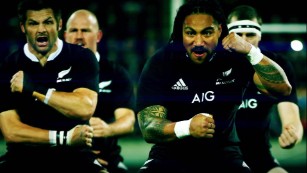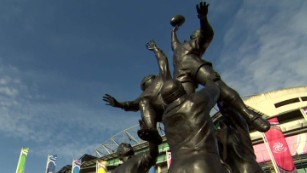Brain injury warning to rugby's macho gladiators
"No-one wore that Welsh jersey with as much pride," Warren Gatland said of the 32-year-old, who contracted a mild form of epilepsy after repeated head traumas.
By the end of last season Thomas would battle through matches for club side Worcester with trademark commitment but be unable to remember large chunks of it afterwards.
After hanging up his boots on medical advice, he is urging players not to subscribe to the macho culture in the game that demands you carry on at all costs.
"You have to understand a player's mindset," said Thomas, speaking before Saturday's World Cup final between New Zealand and Australia. "You need to want to go out and hurt people, within the rules of the game.
"Let's say it's the World Cup final, you're five minutes into the game and pick up a knock -- you're going to do all you can to get back on the pitch.
"Rugby Union is a great sport, it's a lot safer than many other contact sports. But there's definitely a macho image.
"If you go off with a head injury sometimes you are worried your teammates are going to call you soft.
"There's numerous times in your career when you get a bang, see stars, come off the pitch and chat to your wife that evening and you can't remember much from the game."
Thomas began his career with Swansea before joining Ospreys in 2003, the same year he made his debut for Wales.
A barnstorming performance for his country against the All Blacks at that year's World Cup in Australia underlined Thomas's potential.
He would go on to represent Wales 67 times, helping them win their first Six Nations crown for 28 years in 2005, adding another in 2008.
Known for his wholehearted style, Thomas noticed something was amiss last season.
"I started getting mild seizures during training," Thomas explained.
"I was driving the car one day and it happened, then with the kids in the park. It was maybe six or seven times a day for about six weeks.
"Then there was the memory loss and personality changes."
Thomas reported his symptoms to the medical staff at Worcester and was sent for further tests, which confirmed mild epilepsy.
At that stage it was hoped Thomas could play on under supervision and with medication, but the matches were increasing taking their toll.
"The diagnosis was naturally a little bit worrying," he said. "As a professional athlete though you're almost in denial because you always want to play.
"To be a professional rugby player you always have to overcome hurdles and challenges so when they said you've got a mild form of epilepsy, I thought it's another one to overcome."
Thomas didn't flinch in his approach to the matches but found it increasingly hard to cope with the aftermath.
"My capacity to play was still there, it was just the recovery," he added.
If you go off with a head injury sometimes you are worried your team-mates are going to call you soft
"I think back to the playoffs, two really intense games (which saw Worcester promoted back to England's top division).
"I was happy with my performance levels but then afterward for two or three days I was wiped. Obviously after tough games you are fatigued but mentally I was really fatigued -- I'd get this memory loss.
"When I finished the season and reflected back on it all I thought 'that's not normal what I've put myself through.'
"When the consultant told me that any more knocks could make my epilepsy worse, I had no choice."
The issue of head trauma in rugby has been a huge talking point with the World Cup in full swing.
An injury audit by the Rugby Football Union in February revealed a 59% rise in reported concussions during the 2013-14 season.
The authorities believe the spike is partly due to a better understanding of head injuries, with governing body World Rugby insisting anyone who has suffered concussion, or a suspected concussion, must be removed from the game immediately.
Earlier this month World Rugby released a concussion app in an effort to educating players, parents, coaches, medics and officials.
The concussion debate intensified after a key member of Wales' World Cup squad, George North, suffered two blows to the head during a match with England in February but was allowed to continue playing.
When the 23-year-old had a third head trauma while playing for club side Northampton in March he was stood down by neurologists and only allowed to return to the game in August.
"You see someone like George North get knocked out and carried off the field but it's not just those blows that cause the serious damage," Thomas said.
"Quite often, a symptom for a player, is you come off the pitch at the end of the match after getting a big bang and you can't remember much about the game.
"Speaking to the consultant, it's that kind of thing they are very keen to educate people on. What does the serious damage is when you get the trauma and continue to play."
World Rugby's James Fitzgerald told CNN it was happy with current concussion protocols and that the numbers of players carrying on after a concussion had fallen significantly in recent seasons.
Independent doctors are on hand to help with assessment and can overrule a team doctor if necessary. Fitzgerald said a quadrennial review of the game's laws was already under way and its top priority was player safety.
But he agreed with Thomas that the macho culture of returning to the pitch at all costs had to end.
"He is right and it is changing," Fitzgerald told CNN. "For several years now World Rugby has been engaged in a high-profile education process aimed at changing this culture with a particular emphasis on this area.
"Concussion is a brain injury. It can be very serious and, in extremely rare cases, it can even be fatal. It is no longer acceptable for players to carry on with suspected concussions.
"More than ever before, coaches, referees, parents, medics and the players themselves are realizing that and changing behavior accordingly."
Thomas is adamant that education is the key, not changes to the rules of rugby.
"It's not necessarily the laws of the game that's the problem -- it's the awareness of the injury," he said. "It's more about players not trying to be heroes."
 |
|
 |
|



